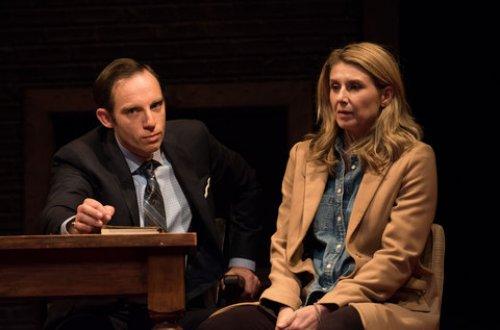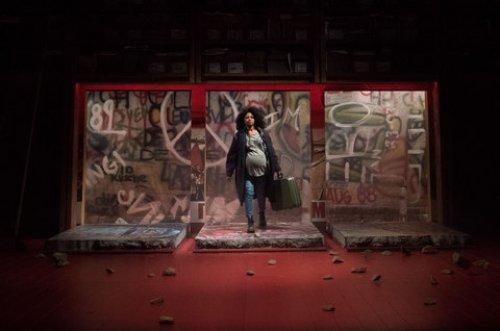Describe the Night
Latest historical-political drama from Rajiv Joseph mixes real events and fiction in a story of fake news and repression in Russia led by Danny Burstein and Zach Grenier.

Zach Grenier, Danny Burstein and Tina Benko in a scene from Rajiv Joseph’s “Describe the Night” (Photo credit: Ahron R. Foster)
[avatar user=”Victor Gluck” size=”96″ align=”left” ] Victor Gluck, Editor-in-Chief[/avatar]After having dealt with Iraqi politics in Bengal Tiger at the Baghdad Zoo and Indian history in Guards at the Taj, playwright Rajiv Joseph has tackled both Russian history and politics in his ambitious drama Describe the Night. Mixing historical characters and fictional ones, the play covers 90 years of Russian history from 1920 to 2010 and travels to ten locales in three countries. The pertinent themes are that of fake news and repression in a totalitarian state but at almost three hours, the play becomes both tiresome and convoluted. Another problem is that most viewers are unlikely to know where the truth ends and where Joseph’s invention begins.
The play begins on the Polish front in 1920 when Soviet Jewish writer and journalist Isaac Babel meets Red Cavalry officer Nicolai Yezhov. In 1937 Yezhov (now head of Stalin’s secret service and his right hand man) introduces Isaac to his wife Yevgenia to whom he is immediately attracted and they begin an affair. In 1940 Babel is shot as an enemy of the state. Skip to 1989 when KGB operative Vova (short for Vladimir) shadows Urzula, the fictional daughter of Isaac and Yevgenia, now living in East Germany behind the Iron Curtain in 1989.
Joseph then attempts to connect his plot about fake news to the coverage of the 2010 Smolensk crash of the plane carrying most of the Polish government as Mariya, a Russian journalist tries to rent a car to flee the crash site. Ultimately, Vova now President of Russia (Vladimir Putin?) confronts Mariya months later with what she claims to know about the crash. While none of this is told in chronological order, it is characters turning up 40 years later as their older selves and younger characters’ relationships to them which makes the play difficult to follow.

Max Gordon Moore and Nadia Bowers in Rajiv Joseph’s “Describe the Night” (Photo credit: Ahron R. Foster)
Joseph seems to want to have it both ways. Stalin’s purges did force fake confessions from its victims and many believe there was a vast cover-up of the Smolensk crash. However, as Yezhov died in 1940 and Yevgenia in 1939 having them interact with characters 40 years later is just as much fake news as the Russian lies that Joseph seems to want to expose. While there is a certain amount of humor (a soup made of leeches with strange properties, Isaac spinning the plot of a film noir to impress Yevgenia when he first meets her), many of the scenes go on too long becoming repetitious and slowing down the pace of the play.
Directed by Giovanna Sardelli who has worked on six earlier Joseph plays, the cast create strong characters but at the same time all seem to be one dimensional. It is as though each were assigned a single attribute or two and used that to develop his or her roles without rising above it: Danny Burstein as Isaac Babel (devious and imaginative), Zach Grenier as Nikolai Yezhov (suspicious), Tina Benko as Yevgenia (seductive), Max Gordon Moore as Vova (tenacious and dangerous), Rebecca Naomi Jones as Urzula, Isaac and Yevgenia’s fictitious grandchild, (determined), Nadia Bowers as contemporary reporter Russian Mariya (desperate) and Stephen Stocking as car rental manager Feliks (fearful). All the characters seem to be pawns in an elaborate game that the author has spun to prove his points.

Rebecca Naomi Jones in a scene from Rajiv Joseph’s “Describe the Night” (Photo credit: Ahron R. Foster)
Tim Mackabee’s unit set is made to look different for each of the many locales. However, the use of teeming file boxes covering the upper walls which are never referred to (supposedly with spy reports, confiscated writings or coerced confessions of various kinds) in each scene is intrusive to say the least. Lap Chi Chu’s lighting design is generally undistinguished except when it turns the stage a symbolic and surrealistic red. More effective is Daniel Kluger’s sound design with its startling off stage knocks at the door or outside explosions. Amy Clark’s costumes are period appropriate to the different time frames of the 90 years covered and help set the scene as the play travels backward and forward.
The themes of Rajiv Joseph’s latest political play are not only valid but relevant in today’s climate. However, Describe the Night is too convoluted for its own good and attempts to make connections where none actually exist. While the cast led by Danny Burstein and Zach Grenier give solid performances, they never seem to develop in any way even though the play covers 90 years. Such momentous events as the Stalinist Purges and the fall of the Berlin Wall are treated almost in passing without their real significance being explored. Ambitious and epic in scope, Describe the Night becomes tiresome rather than enlightening.
Describe the Night (through December 24, 2017)
Atlantic Theater Company
Linda Gross Theater, 336 W. 20th Street, in Manhattan
For tickets, call 866-811-4111 or visit http://www.atlantictheater.org
Running time: two hours and 45 minutes with two intermissions






Leave a comment